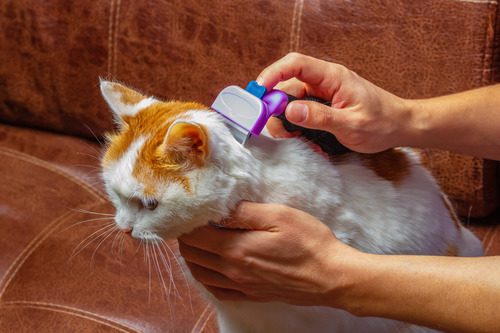A well-maintained coat not only reflects your cat’s good health but also strengthens the bond between you and your feline companion. Dandruff, however, can be a common and frustrating issue for many cat owners. Fortunately, with the right care and attention, you can keep your cat’s coat shiny, soft, and free of flakes. Here are seven practical tips to help you achieve just that.

Provide a Balanced Diet
High-quality cat food that includes the right balance of proteins, fats, and vitamins can significantly reduce the chances of your cat developing dandruff. Omega-3 and Omega-6 fatty acids, commonly found in fish oils, are particularly beneficial for skin health and can help keep your cat’s coat smooth and dandruff-free.
Choosing the Right Food for Your Cat
When selecting food for your cat, look for options that include fish, chicken, or turkey as the first ingredient. These proteins are rich in essential fatty acids that contribute to skin health. Avoid foods with fillers or artificial additives, as these can lead to skin irritation and dandruff. If you’re unsure about the best diet for your cat, consulting with a veterinarian can provide guidance tailored to your pet’s specific needs.
Regular Grooming
Grooming your cat is not only a great way to bond but also a helpful practice to keep their coat healthy. Regular brushing removes loose fur and dead skin cells, which can otherwise accumulate and contribute to dandruff. Grooming also stimulates natural oil production in the skin, which helps to keep your cat’s coat moisturized and shiny. The frequency of grooming depends on your cat’s breed and coat type. Long-haired cats typically require daily brushing, while short-haired breeds may only need grooming a few times a week. Pay attention to any changes in your cat’s coat or skin during grooming, as this can be an early indicator of underlying health issues.
Offer Appropriate Hydration
Just like humans, cats need adequate water intake to maintain healthy skin and coat. Dehydration can lead to dry, flaky skin, which is a common cause of cat dandruff. Encourage your cat to drink more water by providing fresh water daily and considering a cat fountain, which can be more enticing for some cats than a regular water bowl. Signs of dehydration in your cat can include lethargy, sunken eyes, and dry gums. If you notice any of these symptoms, increase your cat’s water intake and consult with your veterinarian at Festival Animal Clinic to rule out any underlying health concerns. Proper hydration can make a noticeable difference in the condition of your cat’s coat.
Maintain a Comfortable Environment
The environment your cat lives in can have a significant impact on their skin and coat health. Dry air, especially in the winter months, can strip moisture from your cat’s skin, leading to dandruff. Maintaining a comfortable humidity level in your home can help prevent this.
Using Humidifiers
If you notice that your home tends to be dry, especially during colder seasons, using a humidifier can add moisture back into the air. This can benefit not only your cat’s skin and coat but also your overall home environment. Additionally, make sure your cat’s bedding is clean and in a draft-free area to provide a comfortable resting place.
Manage Stress
Cats are sensitive creatures, and stress can manifest in various ways, including skin and coat problems. A stressed cat may overgroom, leading to hair loss and dandruff. Providing a calm and stable environment can help maintain your cat’s overall health, including their skin and coat. To reduce stress, ensure that your cat has a quiet, safe space to retreat to. Regular playtime and mental stimulation can also help alleviate stress. If your cat’s stress seems to be linked to specific events, such as changes in the household or new pets, try to introduce these changes gradually and monitor your cat’s behavior closely.
Regular Veterinary Check-Ups
Regular visits to the veterinarian help monitor your cat’s overall health, including their skin and coat condition. Dandruff can sometimes be a sign of an underlying health issue, such as allergies, parasites, or hormonal imbalances. Your veterinarian can provide professional advice and treatment if needed, helping to keep your cat’s coat healthy and dandruff-free.
Introduce Supplements Wisely
In some cases, adding supplements to your cat’s diet can help improve their coat and reduce dandruff. Omega-3 fatty acids, biotin, and vitamin E are commonly recommended supplements that can support skin health. However, introduce any supplements under the guidance of your veterinarian to ensure they are safe and appropriate for your cat.
Discussing Supplements with Your Vet
Before starting any supplement, have a conversation with your veterinarian. They can recommend specific products that are safe and effective for your cat’s needs. They can also help you determine the correct dosage and monitor your cat’s response to the supplements over time.
Addressing Coat Health Year-Round
Maintaining your cat’s coat health requires ongoing attention and care. Following these seven tips can help your cat enjoy a shiny, dandruff-free coat throughout the year. Whether it’s adjusting their diet, regular grooming, or ensuring they have a stress-free environment, each step you take contributes to their overall well-being. If you have concerns about your cat’s coat or notice persistent dandruff, reach out to Live Oak Veterinary Hospital at 209-432-9437 or book an appointment online. We’re here to help you keep your cat looking and feeling their best.
